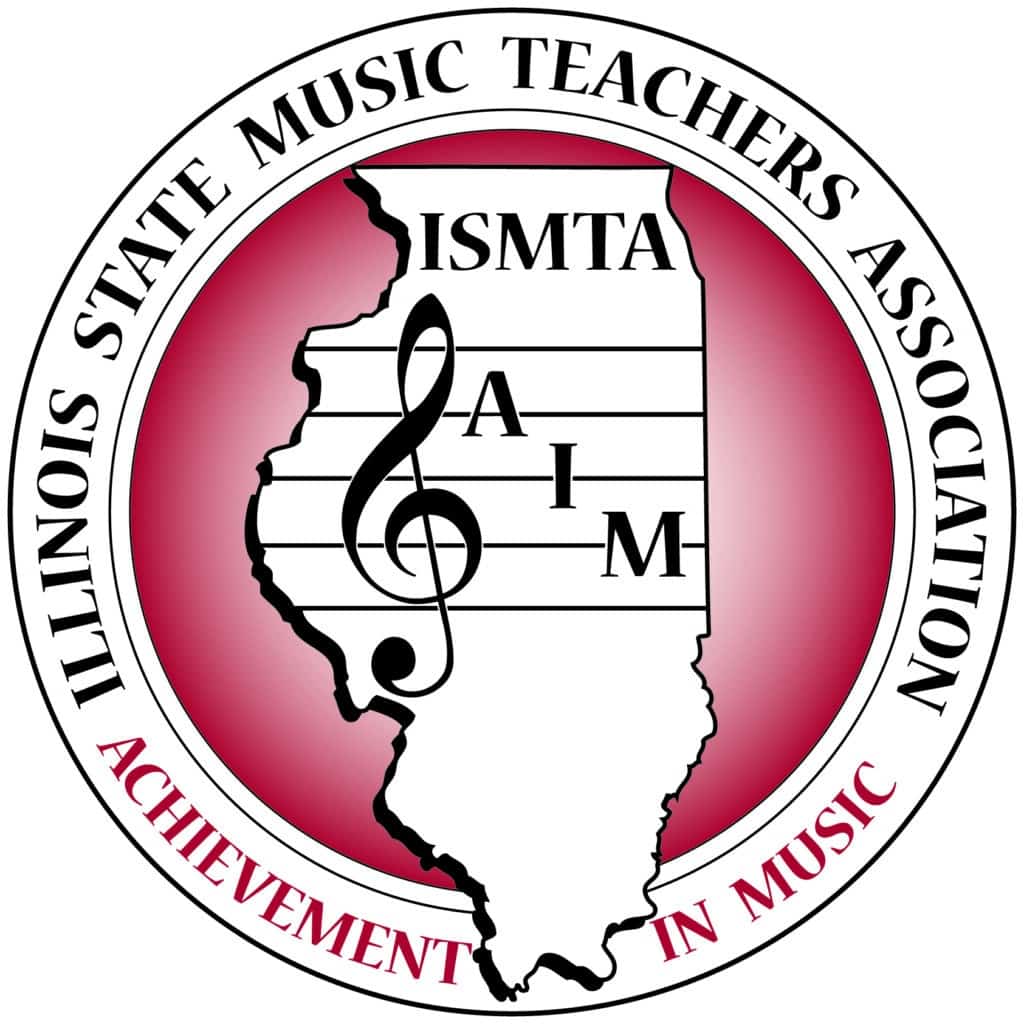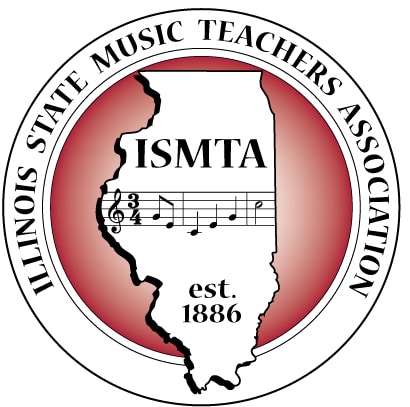AIM
The Achievement in Music Program, also known as AIM, is an exciting and motivating program for students, designed to develop strong performance and technical skills as well as a thorough understanding of musical theory. There are twelve levels in the program, with Level 1 divided into three parts, Levels 1A, 1B, and 1C. Each level has theory, performance, and technical requirements that follow a logical progression from early elementary through advanced.
Typically, AIM is divided into two testing dates:
- Theory, Aural Skills, Sightreading and Harmonization
- Performance and Technique
For performance, students prepare pieces from the syllabus list of repertoire and approved collections.
Students perform:
- 2 pieces for Levels 1-3. Both must be memorized.
- 3 pieces for Levels 4-9. Two must be memorized.
- 4 pieces for Levels 10-12. Two must be memorized.
Students generally prepare one level each year and demonstrate their competency at annual exams, which are conducted by experienced judges in a comfortable setting. Students are not in competition with other students, but are evaluated individually on their accomplishments. Students are recognized with a pin for passing the theory exam and a certificate for passing both the theory and performance exam.
Resources:
New to AIM Brochure
Share with new teachers and prospective students.
Aural Skills Practice
Audio files you can play online.

Committee
Education/Achievement in Music (AIM)
- Director – Nancy Liley
- Piano Coordinator – Debbie Gillette
- Theory Coordinator – Rita Brown
- Piano Revision Advisor – Linda Barker
- Piano Revision Advisor – Marlene Chatain
- Piano Revision Advisor – Jennifer Cohen
- Piano Repertoire Coordinator – Stephanie Myers
- Piano Technology Coordinator – Jia-Yee Tang
- Strings Coordinator – Sue Hofmann Slater
- Strings Revision Advisor – Mary Beth Molenaar
- Voice Coordinator – Sonja Mihelcic
More Information
Contact your AIM Coordinator to learn more about AIM exams in your location. A list of local chapters and AIM contacts may be found clicking here. If your chapter does not participate in AIM, contact the state AIM director. That contact information may be found here.
Students of any age may enter AIM at any level. Teachers will want to evaluate individual students for the appropriate level each year. While the program is progressive, it is not expected that a student complete all levels. Generally, choose a level based on theory competency first, especially when working with a transfer student. A quick check of a student’s sight reading as well as a sample test from the AIM Syllabus should give a teacher a sense of the appropriate level. If a student understands at least half of the material in a sample test, then with a reasonable amount of instructional time, that student should be able to adequately prepare for the exam.
It is better to start at a lower level rather than one that is too high. A student with Level 2 theory skills but Level 5 performance skills should be placed in Level 2 but could be playing Level 5 repertoire, as it is always permissible to pick repertoire from higher levels. Students may skip levels, but it is the responsibility of the teacher to teach all of the skills covered at any skipped levels as the AIM program is cumulative. If a student begins in Level 5, then that student is expected to have mastery of all previous levels as well.
Student workbooks for levels 2 through 12 are available to help in preparing students for the AIM exams. The workbooks written by Karen Rogers may be ordered by students needing a new workbook for each level. You can order the AIM workbooks by clicking here.
Unauthorized copying and sharing of AIM workbooks and materials is illegal.
- Students who pass both Theory and Performance at one level usually proceed to the next higher level.
- Students who do not pass both Theory and Performance may retake a level or advance to a higher level at the discretion of their teacher. Students pay a new participation fee when they retake a level.
- Students may skip a level at teacher discretion, but do not earn awards or certificates for the skipped level. Care should be taken to cover the skipped material because skills and concepts are cumulative.
- Students may only register for performance exams after passing the corresponding theory level.
- Students may skip the performance exam and proceed to higher theory levels earning a theory pin but no certificate.
- Students may take the theory level one year and the corresponding performance exam the next year. Students earn a theory pin the first year and a certificate the second year.
- New repertoire must be performed at each exam level.
Each local association sets their own fees for participation. A portion of those fees is reimbursed to the state as participation fees.
Students participate in yearly AIM exams through their local or state organization, although it is possible to work through the material and complete the Sample Test privately. At Levels 1A, 1B, 1C, and 2, the theory, technique, and repertoire requirements are evaluated at one exam. At Level 3 and above, theory skills are evaluated at a separate exam held before the performance exam.
Most participating teachers serve as exam adjudicators. New teachers may work in other positions until they feel ready to judge. Procedures for judging readiness may vary from chapter to chapter. The Local AIM Coordinator has the discretion to make individual decisions on judge qualifications. Only the student and the examiner are allowed in the exam room, with the exception of new teachers who may observe.
AIM Repertoire Substitution Requests:
Deadline: January 15 at midnight (No exceptions)
Send scanned copy of first and the last page of your requested piece with Level and List (A,B,C D) information to:
Stephanie Myers: hisamimyers@gmail.com
Level 12 Program Approval:
Deadline: 5 months prior to the performance or March 31 at the latest.
Send to: Stephanie Myers: hisamimyers@gmail.com
DOWNLOAD, FILL OUT AND RETURN THIS FORM TO STEPHANIE MYERS
- List all four pieces in Chronological Order with reference to the Syllabus (i.e. Level 12, p. 31)
- If there is a piece that is not from the Syllabus, you will need to get a substitution request before January 15 (see AIM Repertoire Substitution Request Procedures )
- If the student is not playing Sonata Allegro (list B) at level 12, then you must include the information on what the student performed at level 11.
Levels 1-2: Students must receive a final score of 70 or higher to pass and receive a certificate.
Levels 3-12: Students must:
- receive a final score of 70 or higher to pass the theory exam.
- pass the theory exam before taking the performance exam.
- receive a final score of 70 or higher to pass the performance exam.
- pass both theory and performance exams to receive a certificate.
Score recommendations:
| 70-74 | Passing |
| 75-79 | Fair |
| 80-89 | Good |
| 90-94 | Excellent |
| 95-100+ | With Distinction |
The awards below are available from www.ismta.org and may be ordered by the local chapter.
| First exam | Medal with ribbon to display pins. |
| 1 and 2 | Pin and Certificate for passing the exam. |
| 3 and up | Pin awarded for passing Theory exam. |
| 3 and up | Certificate awarded for passing both Theory and Performance. |
The ISMTA state awards below are ordered by Local AIM Coordinators.
Levels 9-12 Piano and Level 8 Voice: A plaque personalized with the student’s name is awarded at each level passed with a final score of 80 or higher on both the theory and performance exams.
AIM Coordinators who are signed into their accounts can place plaque orders here.
Find below the contact information for the AIM Commitee:
Nancy Liley – Director
nancyliley@sbcglobal.net
Debbie Gillette – Piano Coordinator
debbiegillette1@gmail.com
Rita Brown – Theory Coordinator
rbrownstudio@yahoo.com
Stephanie Myers – Repertoire Substitution Chair/Level 12 Program Approval Coordinator
hisamimyers@gmail.com
Dr. Sonja Mihelcic – Voice Coordinator
napervillemusicacademy@yahoo.com
Sue Hofmann Slater – String Coordinator
slatermusic@comcast.net
For more information on the AIM program, please refer to the Forward in the AIM Syllabus.


